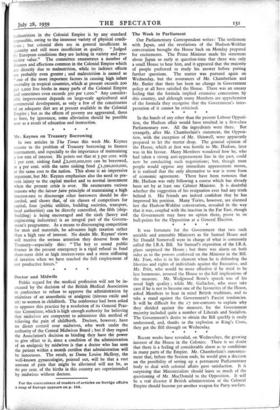Doctor and Midwife Public regard for the medical profession will
not be in- creased by the decision of the British Medical Association in conference to refuse to approve the administration by midwives of an anaesthetic or analgesic (nitrous oxide and air) to women in childbirth. The conference had been asked to approve this practice by a resolution of its General Prac- tice Committee, which is high enough authority for believing that midwives are competent to administer this method of relieving the pain of childbirth. Doctors, however, have no direct control over midwives, who work under the authority of the Central Midwives Board ; but if they regard the Association's decision as binding they have the power to give effect to it, since a condition of the administration of an analgesic by midwives is that a doctor who has seen the patient within a month certifies that administration will be innocuous. The result, as Dame Louise McIlroy, the well-known gynaecologist, pointed out, will be that a vast amount of pain that might be alleviated will not be, as 6o per cent. of the births in this country are superintended by midwives without doctors.








































 Previous page
Previous page